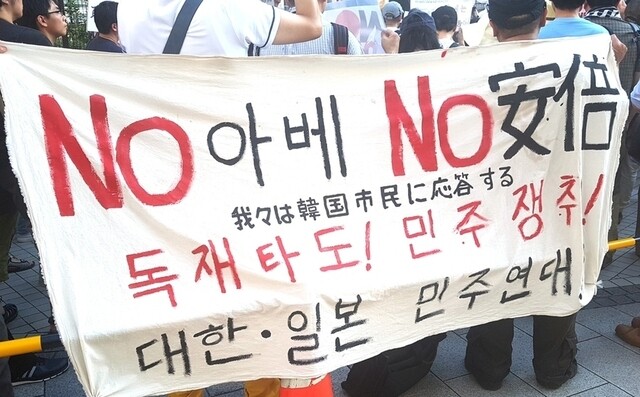hankyoreh
Links to other country sites 다른 나라 사이트 링크
[Editorial] Civic groups should focus on “No Abe” rather than “No Japan”

Since the Japanese government’s adoption of economic retaliation measures, there’s been a growing movement of voluntary “shows of strength” including boycotts across different regions and industries. It goes without saying that this is a legitimate expression of opinion and an exercise of sovereignty by awakened democratic citizens. The increasing movement of solidarity between civic groups in South Korea and Japan even as economic warfare rages is also noteworthy as an extension of this. But some of the excessive reactions and more perplexing behavior that have been taking place are quite troubling. With the South Korea-Japan clash predicted to drag out for a long time, we need to start now in looking for judicious and mature responses – sending a message where the focus is on “no to Abe” rather than “no to Japan.”
For National Liberation Day on Aug. 15, two South Korean and Japan groups titled Joint Action for Resolution of the Forced Mobilization Issue and Settling Historical Matters are set to hold an international peace march together in Seoul. They reportedly plan to start their march at Seoul Plaza and proceed to the Japanese Embassy, where a statement of protest is to be delivered. The two groups previously issued a statement of solidarity at an Aug. 4 candlelit cultural festival in front of the former Japanese Embassy, stressing that South Korean and Japanese citizens “need to join forces in demanding a resolution to the forced labor mobilization issue.”
South Korean and Japanese civic groups are also holding a closed-door forum ahead of National Liberation Day to discuss plans for responding to bilateral relations and organizing an event to honor atomic bomb victims. With figures from the religious community also jointly staging a “prayer meeting for the current situation,” campaigns of solidarity by citizens are taking off like never before. It’s worth considering the message shared by the representative of one civic group, who stressed that it is “important that conscientious citizens in Japan who oppose the Abe administration receive support and solidarity from South Korea so that they can truly have an influence in Japan.” We should pay heed to the argument that the actions of South Korean citizens should not be ones of “opposing Japan,” but ones of criticizing the Shinzo Abe administration.
A controversy recently erupted after a “no Japan” flag was briefly raised on the premises of the Jung-gu (Central) District Office in Seoul. It was eventually removed after over 10,000 people added their signatures to a citizens’ petition board message calling for it to be taken down, with many stressing the need to distinguish between “no to Japan” and “no to Abe” messages. This was a wise decision. Certain politicians’ sale of T-shirts with the slogan “Traveling to Japan = Kopina (a Korean expression meaning to ‘have a nosebleed’)” also looks to be an inappropriate example of patriotic marketing. Na Kyung-won, floor leader for the Liberty Korea Party, crossed the line even for a political attack when she characterized President Moon Jae-in’s remarks as “an ostrich sticking his head in the sand” and “a new isolationism.” To see certain right-wing groups and members of the Protestant community shouting messages like “South Koreans are war criminals too,” “Moon Jae-in must be punished,” and “Stay strong Japan” truly beggars belief.
Please direct comments or questions to [english@hani.co.kr]

Editorial・opinion
![[Guest essay] Preventing Korean Peninsula from becoming front line of new cold war [Guest essay] Preventing Korean Peninsula from becoming front line of new cold war](https://flexible.img.hani.co.kr/flexible/normal/500/300/imgdb/original/2024/0507/7217150679227807.jpg) [Guest essay] Preventing Korean Peninsula from becoming front line of new cold war
[Guest essay] Preventing Korean Peninsula from becoming front line of new cold war![[Column] The state is back — but is it in business? [Column] The state is back — but is it in business?](https://flexible.img.hani.co.kr/flexible/normal/500/300/imgdb/original/2024/0506/8217149564092725.jpg) [Column] The state is back — but is it in business?
[Column] The state is back — but is it in business?- [Column] Life on our Trisolaris
- [Editorial] Penalties for airing allegations against Korea’s first lady endanger free press
- [Editorial] Yoon must halt procurement of SM-3 interceptor missiles
- [Guest essay] Maybe Korea’s rapid population decline is an opportunity, not a crisis
- [Column] Can Yoon steer diplomacy with Russia, China back on track?
- [Column] Season 2 of special prosecutor probe may be coming to Korea soon
- [Column] Park Geun-hye déjà vu in Yoon Suk-yeol
- [Editorial] New weight of N. Korea’s nuclear threats makes dialogue all the more urgent
Most viewed articles
- 1Behind-the-times gender change regulations leave trans Koreans in the lurch
- 2South Korean ambassador attends Putin’s inauguration as US and others boycott
- 3Family that exposed military cover-up of loved one’s death reflect on Marine’s death
- 4Yoon’s broken-compass diplomacy is steering Korea into serving US, Japanese interests
- 5[Guest essay] Preventing Korean Peninsula from becoming front line of new cold war
- 6Marines who survived flood that killed colleague urge president to OK special counsel probe
- 7Japan says its directives were aimed at increasing Line’s security, not pushing Naver buyout
- 8Yoon’s revival of civil affairs senior secretary criticized as shield against judicial scrutiny
- 9Amid US-China clash, Korea must remember its failures in the 19th century, advises scholar
- 10Lee Jung-jae of “Squid Game” named on A100 list of most influential Asian Pacific leaders